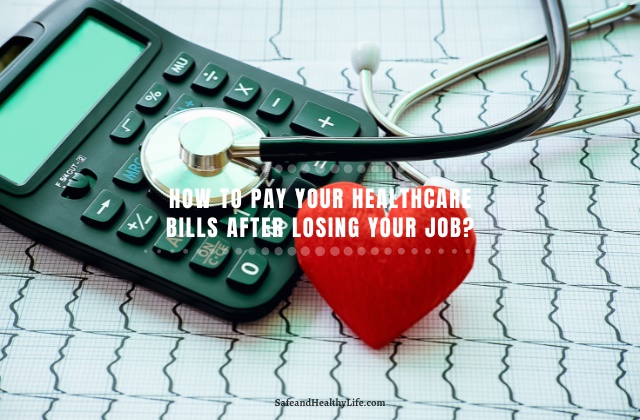
If you’re one of those who has lost their job or been laid off due to the coronavirus pandemic, your cash occurrence may have been reduced to a certain extent or stopped altogether.
However, the bills keep coming; it helps you plan and manage your finances until the crises are passed away, and you’re back on to your duties.
Some companies require employees to pay on their termination; others allow companies to reduce the check on the standard pay schedule.
It merely depends on the situation you’re living in; you may be entitled to collect payment for unused, accrued vacation time and sick days.
In particular, you need to check the employee handbook to determine whether you’re eligible for compensation payment.
According to recent reports, Americans have collected around $140 billion in outstanding medical finances. Lack of insurance and a progressively increasing cost of healthcare are the two significant culprits based on the growing medical financial issue.
However, if you don’t pay your hospital bills?
What if you have collected medical debt and have no way of paying it on a fixed time interval?
In both accounts, the outcomes can be more severe and surpass methods.
The people may relinquish the care they need consisting of doctor appointments, test treatments, and physician-prescribed medications as adopted by Sybrid MD and relevant organizations.
They may have to strive hard to pay other expenditures, which decreases savings, negatively affects their credit, and declares impoverishment.
Steps Needed to Pay your Healthcare Bills
If you want to avoid collecting other medical bills, there are specific steps you can consider before receiving potentially costly treatments to prevent any amazements.
When medical bills are unpaid, your doctor’s hospital or office makes various attempts to contact you based on your due balance.
1. Examine What Happens When Medical Bills are Unpaid
Based on specific estimation, foreclosure, collections, and debt management editor, a publisher of do-it-yourself legal documents and software, your debt is unpaid, managing around 60 to 120 days.
At this particular stage, you can expect to receive multiple calls, messages, and letters from numerous debt collectors, and you might have experienced the chance to negotiate your debt payments.
Ignoring medical debt may significantly decrease your credit score and provides a lawsuit conjunction to you.
Although you have rights in such situations, the collection agencies cannot do any harassment, threaten to arrest you, force you to leave the country, or call you at midnight.
2. Identify and Examine How Medical Bills Impacts Your Credit
Unpaid medical debts can harm your acquired credit score. But as of July 1, the recent credit reporting bureaus – Equifax, Experian, and TransUnion- will add a significant enhancement to how medical debt impacts your credit score.
Initially, paid medical debt will be easily removed from consumers’ credit scores. Secondly, the current waiting period of 180 days before the unpaid medical debt is added to credit reports will leverage to one year.
Also, starting in 2023, if your outstanding medical finances are almost $500 or less, it doesn’t hurt your credit score.
3. Check Medical Bills for Errors
If you are astonished by your medical bill or are doubtful that your medical bill results in an error, you need to contact your doctor instantly. The procedure is often mispresented.
As Gross says, the outcome of incorrect bills can be costly. She said, “the foremost thing you have to do is to consult your doctor.”
Further, she said, “the number on the bill is quite often an outsourced billing company, and they’re not doing anything for you because they are paid as a percentage and allow you to get their money.
You need to go directly to the provider and discuss your issue with him.
4. Negotiating Medical Bills
You can negotiate medical bills before and after it proceeds to the collection phase. The medical providers may be willing to accept a less amount paid in a collective sum or may provide a discount.
Pay the remaining balance at a particular time if you’re making a sizeable down period. Hospitals and healthcare service providers might be willing to provide a discount for uninsured patients.
5. Get Assistance in the Payment of Medical Bills
If you’re to advocate for a patient simply and precisely, start getting assistance with medical bills.
For Instance, the patient advocate foundation is a nonprofit organization that manages multiple cases and resources for educational purposes.
If you want to benefit from free management of issues, patients should be diagnosed with a chronic illness, a life-threatening and debilitating illness.
The support might help appeal health insurance denials and help navigate Medicaid, Medicaid, and less costly healthcare and medicine programs. It also supports payment for food, rent, usage, and transportation.
“Appeals and Denials can be classified as very technical, but if you have a good sense of guidance, overall 40% of cases can be appealed and overturned in the patient’s favor,” says an official at the Patient Advocate Foundation. “It is a process that can be managed.” Private patient advocacy and medical bill management organizations also provide their services by exchanging a fee.
Hospitals themselves may also offer financial assistance to qualified low-income patients who cannot repay their medical bills.
Now, you can check with your hospital and consider applying for financial assistance even if you think you may not be considered qualified.
6. Consider Filing for Bankruptcy for Medical Bills
In some instances, you need to fill for bankruptcy for medical bills might be your suitable option to get this debt discharged, but weigh such decisions carefully.
Bankruptcies might remain identical on our FICO credit report for up to a decade, making it difficult for you to borrow in the future. You need to consult a bankruptcy attorney before scrolling down this phase.
About The Author:
Stacey Smith is a freelance health writer. She is passionate to write about women’s health, dental health, diabetes, endocrinology, and nutrition and provides in-depth features on the latest in health news for medical clinics and health magazines.




